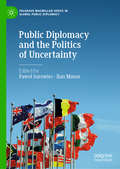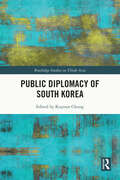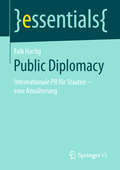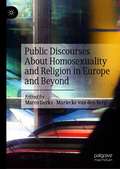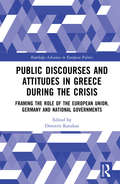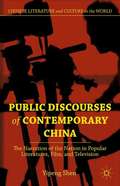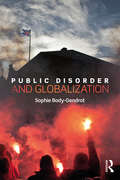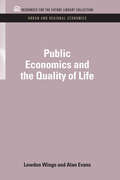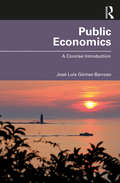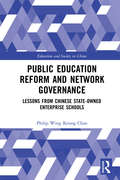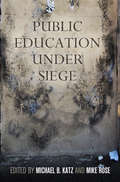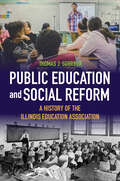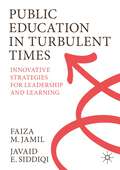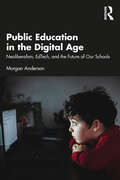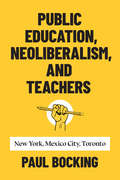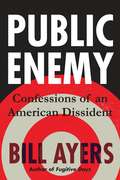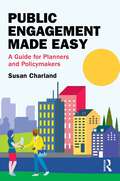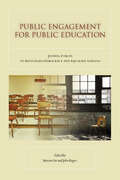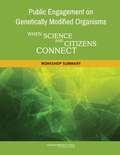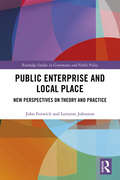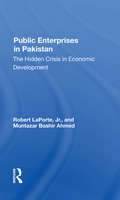- Table View
- List View
Public Diplomacy and the Politics of Uncertainty (Palgrave Macmillan Series in Global Public Diplomacy)
by Ilan Manor Paweł SurowiecThis edited book explores the multi-layered relationships between public diplomacy and intensified uncertainties stemming from transnational political trends. It is the latest wave of political uncertainty that provides the background as well as yields evidence scrutinised by authors contributing to this book. The book argues that due to a state of perpetual crises, the simultaneity of diplomatic tensions and new digital modalities of power, international politics increasingly resembles a networked set of hyper-realities. Embracing multi-polar competition, superpowers such as Russia flex their muscles over their neighbours; celebrated ‘success stories’ of democratisation – Hungary, Poland and Czechia – move towards illiberal governance; old players of international politics such as Britain and America re-claim “greatness”, while other states, like China, adapt expansionist foreign policy goals. The contributors to this book consider the different ways in which transnational political trends and digitalisation breed uncertainty and shape the practice of public diplomacy.
Public Diplomacy of South Korea (Routledge Studies on Think Asia)
by Kuyoun ChungThis book introduces South Korea’s public diplomacy and identifies and evaluates the goals and corresponding areas of. It discusses implication for the foreign policy of the current Yoon Suk Yeol administration under the competitive geopolitical landscape.By establishing political diplomacy, economic diplomacy, and public diplomacy as the three pillars of its diplomacy, South Korea has endeavored to enhance its international image and credibility, deepen foreign nationals’ understanding of South Korea’s foreign policy, and expand its soft power across the international community. However, as current U.S.–China competition continues to expand to the domains of the political system and its organizing values, middle powers are struggling to hedge the risk of competition between liberalism and anti-liberalism, which closely relates to every middle power’s state identity and potential coalitions used to pursue certain value via public diplomacy. With that context, the contributions to the book examine the public diplomacy of South Korea and its achievement, the range of domains that it prioritizes, and future directions for such diplomacy amid the competition of great powers. Focusing on the Yoon Suk-Yeol administration’s foreign policy goals and how public diplomacy has been adapted to this framework under the intensifying great power competition between the U.S. and revisionist powers, the book addresses the ideological dimension in the ongoing power to explain how countries’ respective alignments could affect South Korea’s ability to conduct public diplomacy.This book is a novel contribution to the field and will be of interest to researchers in international relations, South Korean foreign policy, and Asian politics.
Public Diplomacy: The Rise Of Confucius Institutes (essentials)
by Falk HartigDiese essential führt kompakt in das Konzept der Public Diplomacy ein. Public Diplomacy wird international in Wissenschaft und Praxis umfassend debattiert und praktiziert, in Deutschland findet der Begriff bisher allerdings nur wenig Beachtung. Es erläutert die Hintergründe, skizziert Akteure, Instrumente und Zielgruppen sowie ähnliche Begriffe. Zudem wirft das essential Schlaglichter auf bisherige Forschungslücken und leitet Möglichkeiten für weitere Forschungen ab, die sowohl für Wissenschaft und Praxis relevant sind.
Public Disclosure and Bank Failures
by Eduardo Levy Yeyati Tito CordellaA report from the International Monetary Fund.
Public Discourses About Homosexuality and Religion in Europe and Beyond
by Marco Derks Mariecke van den BergThis volume addresses three things many people do not discuss candidly with strangers or mere acquaintances: God, sex, and politics. These can easily become topics of fierce debate, particularly when taken together, as has been the case with same-sex marriage legislation, the Vatican’s criticism of “gender ideology,” or the repeatedly asserted claim that Islam, homosexuality, and gender equality are essentially incompatible. This volume investigates what is at stake in these constructions of religion and homosexuality in public discourses. Starting with the Netherlands as a special case study, it proceeds with contributions on other predominantly postsecular countries in central, northern, and southern Europe as well as several postcommunist and postcolonial countries “beyond Europe.” Combining contemporary and historical perspectives and approaches from both the humanities and the social sciences, the contributors explore how national and European identities are constructed and contested in debates on religion and homosexuality.Chapter 2 and Chapter 8 of this book are available open access under a CC BY 4.0 license at link.springer.com.
Public Discourses and Attitudes in Greece during the Crisis: Framing the Role of the European Union, Germany and National Governments (Routledge Advances in European Politics)
by Dimitris KatsikasThis book presents the findings of new empirical research regarding shifts in public discourses and attitudes in Greek society as a result of the crisis. These findings have shown different shades of Euroscepticism and anti-German sentiments, but they have also revealed a normative conflict within Greek society itself. The book shows how economic crises and strict policy conditionality, causing or deepening economic recession in the countries receiving it, has the potential to set in motion a fragmentation process, which transcends standard material stratification and relates to broader political and even cultural rifts among the population. With this, the book serves as a case study of the impact of wider pressures and shifts weighing upon the European Union (EU) and the way European societies perceive the integration process. This text will be of key interest to scholars and students of EU politics, Greek and Southern European studies and more broadly to cultural and comparative politics and political economy and European politics.
Public Discourses of Contemporary China
by Yipeng ShenExploring contemporary Chinese literature, film, and television, Yipeng Shen sheds light on the historical significance of nationalism for mass imagination and identification in the less-than-democratic system of China for the past three decades. Analyzing cultural products from a wide range of media, chapters move from the intellectual idealism of the 1980s, through the post-Tiananmen transition, to the national cinema of the 1990s, and finally to the Internet literature of today. Public Discourses of Contemporary China argues that Chinese subjects have, to varying degrees, transformed the state project of modernization into their own through mass aestheticization of the nation.
Public Disorder and Globalization
by Sophie Body-GendrotThe current growth of incidents of public disorder around the world can be seen as symptomatic of major transformations in globalized society, government, and technology. But while disorder is routinely perceived as a disturbing phenomenon, it can also be a catalyst for positive transformation and regeneration. As social media is increasingly used as a platform for mobilization and organization, local disorder may spread outward through national borders, receiving international coverage and visibility as well as triggering a domino effect of global unrest. Combining qualitative and quantitative research, this ground-breaking text analyzes oppositional notions of order and disorder in global, national, and local contexts and considers the role of the police, the justice system, and other authorities in developing a range of responsive strategies. The author develops a new comprehensive framework for engaging in comparative and historical analysis of public disorder by drawing upon international case studies of public unrest such as 2005 in Paris and 2011 in London; the events in Ferguson and Baltimore that seeded Black Lives Matter; the Occupy movements in Zuccotti Park, Gezi Park, and Hong Kong; and the terror attacks in Paris and Brussels. This dynamic comparative study is informed by extensive international interviews and will be a required reading for students and scholars of criminology, sociology, political science, and urban studies.
Public Economics
by Gareth D. MylesThis textbook provides a thorough treatment of all the central topics in public economics. Aimed at senior undergraduate and graduate students, it will also be invaluable to professional economists and to those teaching in the field. The book is entirely self-contained, giving all the equilibrium theory and welfare economics needed to understand the analyses. The author covers the Arrow-Debreu economy, welfare economics and the measurement of inequality and poverty which lay the foundations and emphasise the important role played by information. Within the competitive economy, he examines commodity taxation, income taxation and tax reform in a certain environment. He goes on to study the public economics of uncertainty, and then treats public goods, externalities, imperfect competition and tax evasion as departures from the standard competitive assumptions and looks at their implication for public economics derived.
Public Economics and the Quality of Life (RFF Urban and Regional Economics Set)
by Alan Evans Lowdon Wingo Jr.This book argues that, if redistribution was the dominant political theme of the 1960s, that of the 1970s would have been most assuredly quality. Furthermore, this seeks to poorly articulated normative concerns of physical and environmental planners to the intellectual tools, old and new, with which economists were addressing policy issues. This will be of particular interest among practitioners and theoreticians identified with the policy sciences.
Public Economics: A Concise Introduction
by José Luis Gómez-BarrosoPublic Economics: A Concise Introduction provides a concise and non-technical overview of the role of government in the economy. Using the questions ‘why?’, ‘what for?’ and ‘how?’, the text initially surveys the place of the public sector in a market economy. It then considers the possible reasons which could justify government involvement. Next, the book examines the aims of state economic activity, and the instruments which a government has at its disposal. Lastly, the final chapter provides an illuminating tour of economic history and history of economic thought in relation to government economic activity. The book offers an international focus throughout, with examples taken from all over the globe. Readers are supported with a range of pedagogical features, including example boxes, chapter objectives and summaries, and end-of-chapter multiple choice and reflection questions. Public Economics: A Concise Introduction will be a valuable text for students on courses in public economics, welfare economics, public finance, public policy and related areas.
Public Education Reform and Network Governance: Lessons From Chinese State-Owned Enterprise Schools (Education and Society in China)
by Philip Wing ChanThis book is located in the field of education governance and sits amidst debates on public school reform in China. It examines how a top-down policy approach has been implemented from central government right down to the district level within the public education system in China. It shows the way networks support negotiation and bargaining at the district level which, in turn, influences the broader education policy of the central government. Using statistical data from education yearbooks, government documents analysis and interviews with main stakeholders in this policy arena, the book incorporates case studies from railway State-Owned Enterprise schools. Analysis of these indicates that the processes of formulating and implementing Chinese education policy can be characterised as a form of network governance, which coordinates actors, decision-making processes and stakeholders’ motivation to comply with collective decisions in Chinese education. Network governance acts as an effective and legitimate way of problem solving that assists policy implementation and education reform in China. By comparing two traditional modes of governance (governance through bureaucracy and the governance through markets), this book shows the network mode of governance in Chinese education is more powerful and significant, especially since the negotiated results among actors in the policy community are favourable.
Public Education Under Siege
by Mike Rose Michael B. KatzProponents of education reform are committed to the idea that all children should receive a quality education, and that all of them have a capacity to learn and grow, whatever their ethnicity or economic circumstances. But though recent years have seen numerous reform efforts, the resources available to children in different municipalities still vary enormously, and despite landmark cases of the civil rights movement and ongoing pushes to enact diverse and inclusive curricula, racial and ethnic segregation remain commonplace. Public Education Under Siege examines why public schools are in such difficult straits, why the reigning ideology of school reform is ineffective, and what can be done about it.Public Education Under Siege argues for an alternative to the test-driven, market-oriented core of the current reform agenda. Chapters from education policy experts and practitioners critically examine the overreliance on high-stakes testing, which narrows the content of education and frustrates creative teachers, and consider how to restore a more civic-centered vision of education in place of present dependence on questionable economistic models. These short, jargon-free essays cover public policy, teacher unions, economic inequality, race, language diversity, parent involvement, and leadership, collectively providing an overview of the present system and its limitations as well as a vision for the fulfillment of a democratic, egalitarian system of public education.Contributors: Joanne Barkan, Maia Cucchiara, Ansley T. Erickson, Eugene E. Garcia, Eva Gold, Jeffrey R. Henig, Tyrone C. Howard, Richard D. Kahlenberg, Harvey Kantor, Michael B. Katz, David F. Labaree, Julia C. Lamber, Robert Lowe, Deborah Meier, Pedro Noguera, Rema Reynolds, Claire Robertson-Kraft, Jean C. Robinson, Mike Rose, Janelle Scott, Elaine Simon, Paul Skilton-Sylvester, Joi A. Spencer, Heather Ann Thompson, Tina Trujillo, Pamela Barnhouse Walters, Kevin G. Welner, Sarah Woulfin.
Public Education and Social Reform: A History of the Illinois Education Association
by Thomas J. SuhrburFounded in 1853, the Illinois Education Association (IEA) and its predecessors have played a vital role in shaping the Illinois public school system. Thomas J. Suhrbur’s history covers the lifespan of the IEA within the larger story of state public education as a battleground for contentious social and economic issues. Suhrbur pays particular attention to the impact of race, gender, religion, and tax policy on the IEA and public schools. He also examines the IEA’s evolution from a professional organization controlled by administrations and officials through its radical transformation into a teacher-led independent labor union. As a workers’ organization, the IEA successfully fought for collective bargaining and organized K–12 and higher education while continually standing against right-wing efforts to privatize education and undermine public schools with vouchers, for-profit institutions, and tax credits. Multifaceted and up to date, Public Education and Social Reform tells the story of the organization and figures dedicated to sustaining and advancing Illinois public education.
Public Education in Turbulent Times: Innovative Strategies for Leadership and Learning
by Faiza M. Jamil Javaid E. SiddiqiPublic Education in Turbulent Times communicates a bold vision for the future of education, addressing the evolving purpose of American public education and the structural innovations schools are using to meet the needs of a rapidly transforming world. Highlighting key challenges that emerged during the immense economic and social disruptions of recent years, the book leverages case studies of four unique school districts where school communities overcame concerns high in the public consciousness – trauma, danger, economic inequality, and racial injustice. These obstacles have hampered efforts to reclaim lost learning opportunities that could define the educational experiences of a generation of students. If educators revert to business as usual, they risk dismissing essential lessons from resilient schools that thrived in the chaos of a global pandemic and its fallout. This book provides rich insights to refocus readers’ attention on achieving a more equitable and safe education system for the future.
Public Education in the Digital Age: Neoliberalism, EdTech, and the Future of Our Schools
by Morgan AndersonEducational technology is now ubiquitous in schooling, both in P-12 and at universities. Despite the imposition of technology in most aspects of teaching and learning, little attention has been given to the implications educational technology has for healthy student development, humane pedagogy, teacher labor, academic freedom, and the aims of social justice. Rather than merely a set of neutral tools, educational technology is bound up with systems of power and privilege that tend to deepen, rather than confront inequality. In calling for a reassessment of the relationship between schools and technology, this book asks readers to think differently about the role technology can serve in socially just schools. An accessible and compelling read, this book will appeal to students and scholars of sociology, social justice, politics, and all those interested in the impact technology is having on the education system in the USA.
Public Education, Neoliberalism, and Teachers: New York, Mexico City, Toronto
by Paul BockingFrom pressure to "teach to the test" and the use of quantitative metrics to define education "quality," to the rise of "school choice" and the shift of principals from colleagues to managers, teachers in New York, Mexico City, and Toronto have experienced strikingly similar challenges to their professional autonomy. By visiting schools and meeting teachers, government officials, and union leaders, Paul Bocking identifies commonalities that are shaping how teachers’ work and public schools function. While arguing that neoliberal education policy is a dominant trend transcending the realities of school districts, states, or national governments, Bocking also demonstrates the importance of local context to explain variations in education governance, especially when understanding the role of resistance led by teachers’ unions.
Public Enemies: America's Greatest Crime Wave and the Birth of the FBI, 1933-34
by Bryan BurroughThe establishment of the FBI as a force against gang crime in the early 1930's.
Public Enemies: America's Greatest Crime Wave and the Birth of the FBI, 1933-34
by Bryan BurroughIn Public Enemies, bestselling author Bryan Burrough strips away the thick layer of myths put out by J. Edgar Hoover’s FBI to tell the full story—for the first time—of the most spectacular crime wave in American history, the two-year battle between the young Hoover and the assortment of criminals who became national icons: John Dillinger, Machine Gun Kelly, Bonnie and Clyde, Baby Face Nelson, Pretty Boy Floyd, and the Barkers. In an epic feat of storytelling and drawing on a remarkable amount of newly available material on all the major figures involved, Burrough reveals a web of interconnections within the vast American underworld and demonstrates how Hoover’s G-men overcame their early fumbles to secure the FBI’s rise to power.
Public Enemy: Confessions of an American Dissident
by Bill AyersIn this sequel to Fugitive Days, Ayers charts his life after the Weather Underground, when he becomes the GOP's flaunted "domestic terrorist," a "public enemy." Labeled a "domestic terrorist" by the McCain campaign in 2008 and used by the radical right in an attempt to castigate Obama for "pallin' around with terrorists," Bill Ayers is in fact a dedicated teacher, father, and social justice advocate with a sharp memory and even sharper wit. Public Enemy tells his story from the moment he and his wife, Bernardine Dohrn, emerged from years on the run and rebuilt their lives as public figures, often celebrated for their community work and much hated by the radical right. In the face of defamation by conservative media, including a multimillion-dollar campaign aimed solely at demonizing Ayers, and in spite of frequent death threats, Bill and Bernardine stay true to their core beliefs in the power of protest, demonstration, and deep commitment. Ayers reveals how he has navigated the challenges and triumphs of this public life with steadfastness and a dash of good humor--from the red carpet at the Oscars, to prison vigils and airports (where he is often detained and where he finally "confesses" that he did write Dreams from My Father), and ultimately on the ground at Grant Park in 2008 and again in 2012.
Public Engagement Made Easy: A Guide for Planners and Policymakers
by Susan CharlandLocal leaders don’t need to become professional facilitators or hire expensive consultants to run a great meeting. Public Engagement Made Easy offers practical and affordable methods that bring ease to one of the most challenging aspects of any local leader’s role: involving the public. The tools and techniques in this book will empower planners, public managers, decision-makers, and other leaders to implement effective public engagement programs that build trust within communities and contribute to successful decisions that stand the test of time.
Public Engagement for Public Education: Joining Forces to Revitalize Democracy and Equalize Schools
by John Rogers Marion OrrCommunity participation plays a large role in the success or failure of our public schools. This book focuses attention on the problem of inequality in public engagement, considering how race, class, ethnicity, language, and immigration status shape opportunities for engagement. Without the active participation of the public, chances for improving school systems are limited. Without equal opportunity for public engagement, those in the lower reaches of stratified society are left largely on the outside looking in-and that all too easily becomes a self-perpetuating cycle. Public Engagement for Public Educationspeaks to the potential for students, parents, community members, and civic leaders to join forces and create more equitable schooling. Such engagement can expand access to quality educational pathways which in turn paves the way to a stronger voice in society and the promise of the American dream. If segments of society are blocked access to those pathways, the book argues, nothing less than the health of American democracy is at stake.
Public Engagement on Genetically Modified Organisms: A Workshop Summary
by Holly RhodesThe National Research Council's Roundtable on Public Interfaces of the Life Sciences held a 2-day workshop on January 15-16, 2015, in Washington, DC to explore the public interfaces between scientists and citizens in the context of genetically engineered (GE) organisms.<P><P> The workshop presentations and discussions dealt with perspectives on scientific engagement in a world where science is interpreted through a variety of lenses, including cultural values and political dispositions, and with strategies based on evidence in social science to improve public conversation about controversial topics in science. The workshop focused on public perceptions and debates about genetically engineered plants and animals, commonly known as genetically modified organisms (GMOs), because the development and application of GMOs are heavily debated among some stakeholders, including scientists. For some applications of GMOs, the societal debate is so contentious that it can be difficult for members of the public, including policy-makers, to make decisions. Thus, although the workshop focused on issues related to public interfaces with the life science that apply to many science policy debates, the discussions are particularly relevant for anyone involved with the GMO debate. "Public Engagement on Genetically Modified Organisms: When Science and Citizens Connect" summarizes the presentations and discussion of the workshop.
Public Enterprise and Local Place: New Perspectives on Theory and Practice (Routledge Studies in Governance and Public Policy)
by John Fenwick Lorraine JohnstonThis book presents the key interactions in local government and public enterprise, drawing together the challenges for local governance in the practice of public entrepreneurship and its response to collaboration, place and place making. Specifically, this book includes the impact of local partnerships and public entrepreneurs in local policy implementation. It is written by established authors bringing together their experience and practice of local partnerships and public entrepreneurship in place-based strategies, and will be of value to local government, new forms of enterprise partnerships, wider agencies and public entrepreneurship scholars as well as policymakers responsible for implementation of place-based regeneration. This text will be of key interest to students, scholars and practitioners in public administration, business administration, local government, entrepreneurship, public sector management and more broadly to those with interests in public policy, business and management, political science, economics, urban studies and geography.
Public Enterprises In Pakistan: The Hidden Crisis In Economic Development
by Robert Laporte Muntazar Bashir AhmedThis book contains a study of the economics and management of public enterprises in Pakistan. It examines their performance, organizational behavior, relationships with other government organizations outside of the sector, and the issues that confront the public enterprise sector and the government.
